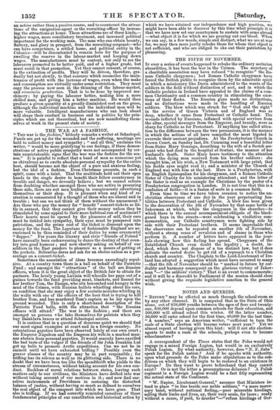THE FIFTH OF NOVEMBER.
Jr ever a series of events happened to rebuke the ordinary sectarian absurdities, it has been the war in the Crimea. The secretary of a charitable association may have refused "to recognize" the Ro- man Catholic clergymen ; but Roman Catholic clergymen have forced the British public to recognize them by the admirable spirit in which a missionary like Davis administered to the wants of the soldiers in the field without distinction of sect, and in which the Catholic prelates in Ireland have appealed to the claims of a com- mon Christianity and a common country in stimulating the exer- tions of their flocks. The Russian guns made no distinctions, and no distinctions were made in the handling of Russian soldiers. The blow which was struck for "God and the right" in the service of Queen Victoria and of England was as deep, whether it came from Protestant or Catholic hand. The wounds inflicted by Russians, inflamed with special services from the altar, special messages from the Emperor, and brandy, were as sharp for Catholic as for Protestant. If anything has called atten- tion to the difference between the two persuasions, it is the manner in which the actions of all have compelled the most bigoted to overrule their ancient prejudices. At the Presbyterian Church in Crown Court, on Sunday last, Dr. Cumming read a beautiful letter from Sister Mary Gonzaga' describing to the wife of a Scotch ser- geant who had died in the hospital at Scutari, the manner of her husband's death. Sister Mary bears testimony to the attention which the dying man received from his brother soldiers : she brought him, at his wish, a New Testament with large print, that his feeble eyes might read it; and a minister of the Church of England was with him at the last. Here is a Presbyterian' with an English Episcopalian for his clergyman, and a Roman Catholic Sister of Charity for his ministering attendant ; and the letter of the Sister is read as an example for Christians by the pastor of a Presbyterian congregation in London. It is not true that this is a confusion of faiths—it is a fusion of sects in a common faith.
From time to time we have taken occasion to notice the un- christian observance of one day in the year perpetuating hos- tilities between Protestant and Catholic. A blow has been given to the desecration of the 5th of November by that same battle of Inkerman at which, while the clergymen in the churches—to which there is the annual accompaniment-obligato of the black- guard boys in the streets—were celebrating a vindictive com- memoration, our Catholic countrymen were fighting side by side with their Protestant brethren. It seems improbable that the observance can be repeated on another 5th of November, without a strong sense of revulsion and of shame in those who perform it. A number of letters have appeared in the jour- nals showing how this feeling has spread. Clergymen of the Established Church even doubt the legality ; a doubt, in- deed, which does not dispose of a too distinct law, but it does indicate the rooted desire to get rid of a reproach to a Christian church and country. The Chaplain to the Lord-Lieutenant of Ire- land has adopted a suggestion which must have occurred to many —that the 5th of November should be "marked in future by cor- diality and harmony consequent on the glorious victory of Inker- man ' —" the soldiers' victory." That is an event to commemorate; and it will be a discredit to Parliament if the session should close without giving the requisite legislative sanction to the general wish.


































 Previous page
Previous page